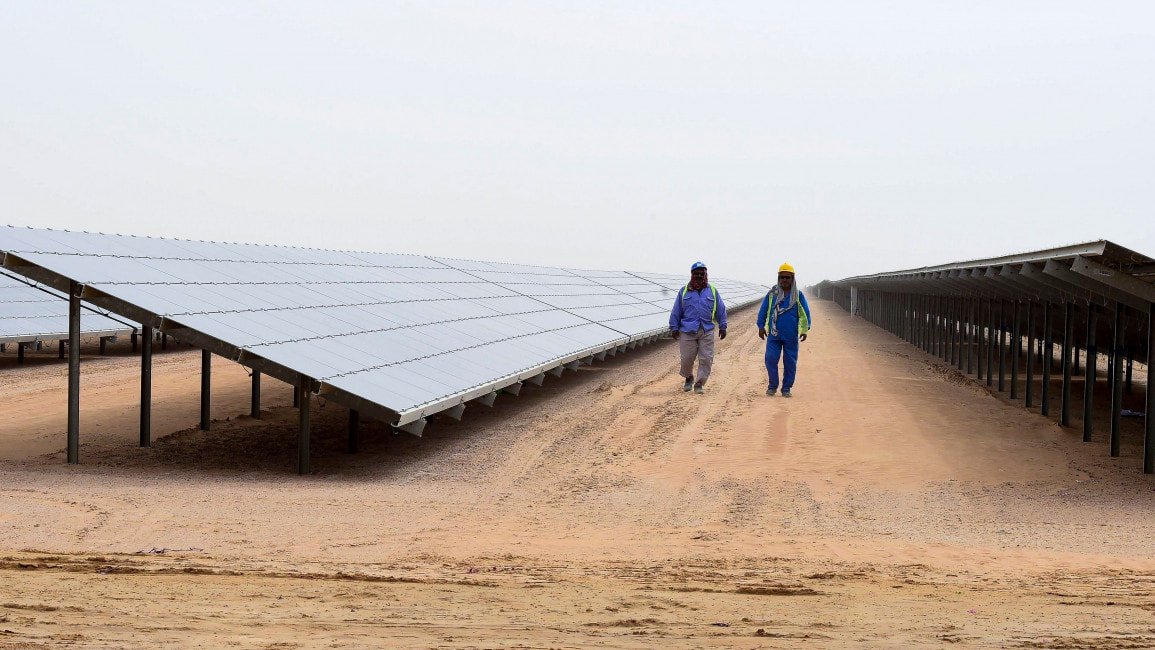In June, Iraq signed an agreement with Emirati-owned energy company Masdar to develop solar plants in central and southern parts of the country that can generate up to 2GW of power.
The deal is part of Iraq's wider plans to lessen its dependence on fossil fuels and diversify its economy. In parallel, it is indicative of the UAE's "climate diplomacy". That is, the use of its renewable energy capabilities to increase its ties with Iraq and counter the influence of regional powers such as Iran. While the Emirates has invested money in Iraq to this end since at least 2003, little will be gained if such projects do not materialise.
Emirati interests in Iraq
Iraq has long been an arena where rivalries between regional and international powers have played out. This is no truer than in the case of tensions between Iran and its neighbours in the Gulf Cooperation Council (GCC), including the UAE. Since the US-led invasion, the Emirates has relied on soft power to keep Iranian influence in Iraq at bay. In doing so, it has been able to bolster its own defences and increase its ties across the region.
The Emirates, along with other GCC states, is also well known to covertly sponsor Sunni Iraqi politicians and parties as a means of countering the influence of their Shia and Iran-backed competitors.
Revelations as part of the Pegasus Project have shown a more sinister side to this strategy, with the UAE having used spyware to monitor the actions of Iraqi politicians and militia leaders with ties to Iran, Iranian diplomats in Iraq and Shia religious figures, including the highest Shia authority Ayatollah Ali al-Sistani. In this way, the Emirates has also been able to access key intelligence information and keep tabs on many of the main Iran-backed actors in Iraq without their knowledge.
The UAE's interests in Iraq have only grown stronger under the premiership of Mustafa al-Kadhimi, who has presented himself as trying to curb Iranian influence in the country and sought to get closer to the GCC monarchs. As part of this, in April he visited the UAE and secured an investment worth $3bn from the state. The solar energy deal came hot on the heels of this agreement.
Climate diplomacy
Iraq is considered to be one of the most vulnerable countries to climate change in the Middle East. The World Bank predicts that temperatures in the country will rise by 2°C by 2050, while rainfall will decline by around 9%.
At present, the vast majority of energy used in Iraq is derived from fossil fuels. In light of this, there is no doubt that deals like the one struck with Masdar are necessary for ensuring that Iraq moves away from its dependence on fossil fuels and makes the most of the long hours of sunshine it enjoys.
The agreement with Masdar is also important because it will allow Iraq to work towards diversifying its economy and achieving self-sufficiency. Currently, over 90% of all public funds in Iraq come from the sale of crude oil, leaving the country vulnerable to the unpredictability of global markets. In addition, at the current rate of extraction, it is predicted that Iraq will run out of fossil fuels in the next century. As such, it is more crucial than ever for the country to develop alternative investments.
However, the significance of this form of climate diplomacy for the UAE should not be underestimated. It allows for the forging of strong permanent ties between the Gulf state and Iraq, leaving the latter largely dependent on the UAE for some of its most important long-term projects. In addition, it allows the Emirates to outcompete some of Iraq's main economic partners and energy providers such as Iran and Turkey. The impact of this will be particularly dire for Iran, whose economy largely depends on exports to Iraq due to US sanctions.
In addition, electricity is among the most hotly contested issues in Iraq. Since at least 2011, the government's failure to provide services, and electricity in particular, to its citizens during the sweltering summer months has led to outbreaks of mass protests and calls for reform.
The country's electricity needs will only continue to increase as the size of the population grows at one of the fastest rates in the Middle East. Thus, the move to develop renewable energy in Iraq can be seen as part of a strategy by the UAE to win hearts and minds. After all, ordinary Iraqis will have the Emirates to thank for the provision of electricity and politicians for the loyalty of their citizens.
A done deal?
However, whether Iraqi citizens will see any tangible benefits from the Masdar deal will largely depend on the success of efforts to tackle politically sanctioned corruption. By and large, this is the central reason for Iraq’s inability to provide electricity to its citizens, opening the way for regional powers such as the UAE to use the country as a battleground for its rivalries.
The Ministry of Electricity, with whom the deal was struck, remains one of the worst offenders, with an investigation conducted by parliament at the end of 2020 revealing that nearly 75% of the $81bn spent on electricity between 2005 – 2009 was lost to corruption.
In light of this, it is important to ask why there has not been any public scrutiny around the solar power deal struck with the UAE, as well as why public information remains scarce on the exact size and nature of this deal.
Ultimately, if the UAE’s investments in Iraq are really aimed at producing positive long-term change, rather than merely a tactic for challenging Iran’s influence in the country, then they must be done transparently and carried out in a way that allows for accountability and ensures that they benefit all Iraqis.
Source (Click Here)


 RSS Feed
RSS Feed